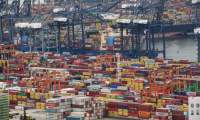Chinese Exports to Russia Decline After Invasion of Ukraine

China’s exports to Russia declined in March, official data showed on April 13, in a sign that Chinese companies may be displaying more caution when it comes to trading with Moscow following its invasion of Ukraine in February.
Data shows that Chinese firms sold $3.8 billion worth of goods to Russia in March 2022, representing a 7.7 percent decline from a year earlier and the lowest amount since May 2020 amid the COVID-19 pandemic, which drastically impacted global trade.
Meanwhile, imports from Russia increased 26.4 percent from a year ago.
While data regarding which goods were imported will be available later in the month, China typically purchases oil, natural gas, coal, and agricultural products from Russia.
In return, China sells Russia electronic equipment, transportation equipment, machinery, mobile phones, cars, and other consumer products.
Typically, the country buys more from Russia than it sells to Russia.
In March, China received 188,000 tons of liquefied natural gas—used to generate electricity and heat— from Russia, down from 273,000 tons a year earlier, according to data compiled by Bloomberg.
While China has been steadily increasing its gas imports from Russia since 2019, when Moscow began sending gas to the country via its Gazprom-operated Power of Siberia pipeline, that amount is still less than 11 percent of what China imported from its top supplier, Australia, in March, Bloomberg reported.
However, those gas imports may have slowed down due to various issues in March such as pipeline maintenance and the recent outbreak of COVID-19 in the country, which has resulted in the Chinese Communist Party (CCP) utilizing an excessive “zero Covid” strategy and enforcing lockdowns and tighter controls at ports of entry.
Shanghai reported 26,330 confirmed COVID-19 infections on April 13, a new daily record.
Yet analysts at Bloomberg believe imports of gas from Russia could rise by 3 billion cubic meters this summer, from 10 billion cubic meters in 2021, in an effort to keep up with the existing supply contract between the two nations. Gazprom is contracted to deliver up to 38 billion cubic meters of gas a year by 2025.
Data released in January from the CCP’s General Administration of Customs shows that overall in 2021, China’s total trade with Russia grew 36 percent to $147 billion.
Beijing has criticized trade and financial sanctions imposed on Moscow by the United States, Europe, and Japan over its invasion of Ukraine, and earlier this month the CCP joined India, which also maintains close relations with Moscow, in abstaining from a vote on the United Nations resolution condemning Russia’s invasion of Ukraine and demanding that it immediately end its military operations in the country.
In February, Chinese leader Xi Jinping met with Russian President Vladimir Putin and they laid out a plan to increase their bilateral trade to the equivalent of $250 billion by 2024, up from $140 billion in 2021.
However, the latest data appears to indicate that Chinese companies may be showing skepticism regarding trade with Moscow and are choosing to abide by Western sanctions levied against the country in an effort to safeguard against possible losses in dealings with Russia.
The latest trading figures come as Russia’s economy is on track to contract by more than 10 percent in 2022, marking the biggest fall in gross domestic product since the years following the 1991 fall of the Soviet Union, former finance minister Alexei Kudrin said on April 12.











